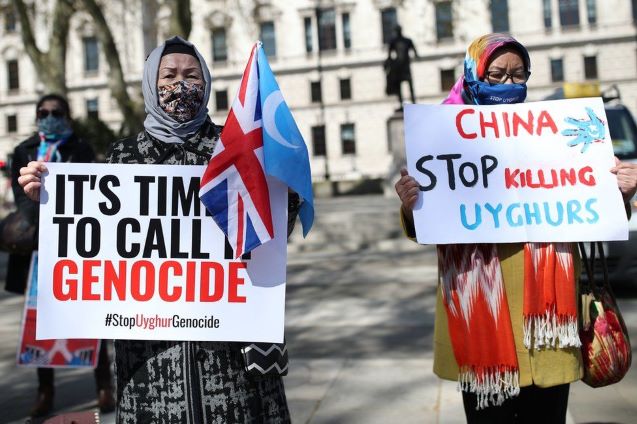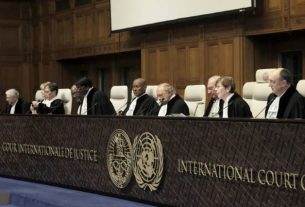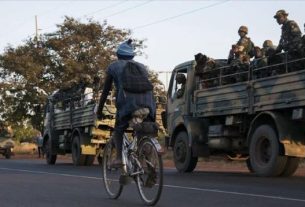The death of a 49-year-old Uyghur asylum-seeker in Thailand has prompted pleas from rights groups to find a humane solution to the plight of around 50 Uyghur men who have been detained for nine years.
Aziz Abdullah died after he collapsed in the Immigration Detention Centre in Bangkok where he was being held.
He was part of a wave of more than 350 Uyghur asylum-seekers who fled from Xinjiang in western China in 2013, and were detained in Thailand.
China has been accused of committing crimes against humanity against Uyghur Muslims and other minorities in Xinjiang, where human rights groups believe more than a million people have been held in a vast network of detention camps in recent years. Beijing, which calls them “re-education camps”, denies all allegations of abuse.
Aziz Abdullah had been a farmer in a remote part of south-western Xinjiang, and arrived in Thailand with his pregnant wife, his brother and seven children sometime in late 2013.
Activists who have been in touch with inmates at the Immigration Detention Centre say he had been seriously ill for more than three weeks, but that the Thai authorities had refused to send him to hospital until he collapsed.
“He was coughing and vomiting blood – he could not eat,” says Polat Sayim, the Australia-based director of the Refugees Centre of the World Uyghur Congress.
“A doctor at the IDC examined him and said it was not a real sickness, that his condition was normal.”
He was finally taken to hospital after his collapse, but pronounced dead soon afterwards. The death certificate issued by the hospital specifies a lung infection as the cause of death.
Activists say his group was trying to reach Malaysia, and eventually Turkey, when they were intercepted in southern Thailand.
At the time, most Uyghurs claimed to be Turkish to avoid being repatriated to China, and Turkey was giving some of them citizenship. In early July 2015 the Thai authorities allowed 173 of them, including Aziz Abdullah’s wife and children, to be flown to Turkey.
However, China objected strongly to this, accusing Turkey of interfering in a bilateral issue and of “conniving in illegal immigration activities”.
The Thai government had also allowed Chinese embassy officials to visit and assess the asylum-seekers, and on 8 July 2015, in defiance of pleas from the UN’s refugee agency UNHCR and several governments, Thailand forcibly repatriated at least 109 Uyghur men, putting them on a plane, handcuffed and hooded, back to China.
They included Aziz Abdullah’s brother.
They were described by Chinese state media as being members of people-smuggling gangs, with some accused of involvement in terrorism. There has been no information about the fate of the men after their arrival in China.
The Thai government defended its decision, saying the Chinese had asked for all the Uyghurs to be repatriated, but that it had only sent some.
Six weeks later, a powerful bomb exploded at a shrine in central Bangkok that was popular with Chinese visitors, killing 20 and injuring many others. The Thai government insisted that it was a consequence of rivalry among people-smuggling groups, but evidence that emerged afterwards pointed to Uyghur militant groups as the likely perpetrators.
Two Uyghur men were detained and charged with the bombing, although one of them, who insists he is innocent, may just have been another asylum-seeker, caught when Thai police raided a house thought to have been used by the bomb-makers.
Their trial has been repeatedly postponed, more than eight years after they were arrested; the Thai authorities seem in no hurry to finish it, and the two men are languishing in custody.
Until last year the remaining 50 or so Uyghur detainees were being held in detention centres in different parts of Thailand, but after three of them managed to escape they were all moved to the notoriously overcrowded Immigration Detention Centre in Bangkok.
Conditions are poor, say activists trying to help them, and the Uyghurs are kept separated from each other, with almost no contact with the outside world.
“It is even worse than regular Thai prisons,” says Chalida Tacharoensuk, from the People’s Empowerment Foundation, which has been pushing for better treatment of the Uyghurs.
“It is very crowded. There is a lack of food, and the food provided is not healthy. There is no halal food for Muslim detainees. The drinks are not clean either – they have to drink tap water. There is barely any healthcare. If they get sick, they only get pain-killers or similar medications.”
Phil Robertson from Human Rights Watch said: “This death is an entirely predictable outcome of a Thai policy decision to lock away these Uyghurs and, essentially, to throw away the key.
“Clearly no thought was given to the health implications of indefinite detention in cramped, unsanitary immigration cells with wholly inadequate healthcare and nutrition.”
The BBC tried calling a spokesman for the Bangkok IDC but was unable to get a response. A spokesman for the Thai police had no comment.
The UNHCR says it has been allowed no access to the detainees. The Thai National Human Rights Commission has also been seeking permission to visit the Uyghurs in the IDC for several months.
It was finally given a date this month, and will go in later this week.
The Thai government has promised to work with the UN to improve the screening and treatment of the tens of thousands of refugees and asylum-seekers who are inside the country, but this has yet to bring any significant improvements to conditions inside the Bangkok IDC.
Campaigners believe the Uyghurs would be very likely to get third country resettlement if Thailand was willing to release them. But, according to a well-placed Thai source, the government’s concern over upsetting China is too great.
Aziz Abdullah’s body was eventually released to members of the Thai Muslim community, and he was buried in a cemetery at a mosque close to the Chao Phraya River in central Bangkok.__Courtesy BBC.com





